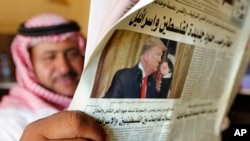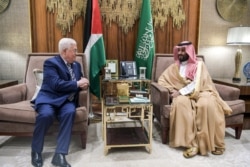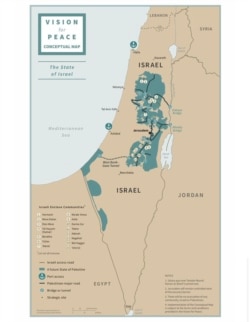The political proximity of Gulf leaders to U.S. President Donald Trump and their eagerness to include Israel in a solidified security stance against Iran has laid bare widening gaps on how to end the Israeli-Palestinian conflict in the wake of Tuesday's revelation of the American administration's Mideast peace plan.
Starting Friday, foreign ministers from Saudi Arabia, United Arab Emirates, and Bahrain will arrive in Cairo for an urgent Saturday meeting of the Arab League, where they will urge Palestinian Authority President Mahmoud Abbas to engage with Trump and the Israelis.
Abbas will ask Arab nations to unite against the initiative. He is joined by critics who say continued Israeli military control and permanent occupation by civilian settlers will result in an unfeasible quasi-state dividing Palestinian lands.
But Saudi Arabia - the Arab world's richest and one of its most populous countries - leads the bloc of states urging the Palestinians to engage with the American initiative.
"The kingdom appreciates the efforts of President Trump's administration to develop a comprehensive peace plan between the Palestinian and the Israeli sides," the foreign ministry said in a statement carried on Saudi state media.
The emerging leadership under Crown Prince Mohammad bin Salman has tired of bankrolling Palestinian resistance to occupation and seeks a definitive break with the idea that Israel can be reduced to the dimensions it achieved after its founding in 1948.
"Any disagreements with the plan should be resolved through negotiations under the auspices of the United States, to move forward the peace process to reach an agreement that achieves [the] legitimate rights of the Palestinian people," said the official Saudi statement.
The Saudis see Trump as a man who keeps his word and have concluded Palestinians must engage with what is on the table now if they want to preserve claims to any of their remaining lands.
"Trump made no secret of his intentions about peace in the Middle East by promising steps that previous American president(s) wouldn't dare to take, such as moving the U.S. embassy to West Jerusalem," said Meshari Al-Dhaidi, a columnist for the Saudi daily Sharq Al Awsat. "He promised to make a major comprehensive approach to the Palestinian or Arab-Israeli conflict, and he did."
Al-Dhaidi expects to hear severe objections to the plan from the Iraqi and Lebanese delegations under the sway of Iran and Qatar in alignment with the Muslim Brotherhood.
"Unfortunately, we will see a large market for trading again on the Palestinian issue, without any feeling of 'realistic' responsibility towards this victimized people," he said.
Alignment between American, Saudi, and Emirati positions on the need to check Iranian power in the region has led these Arab states to push the Palestinians to engage with the Trump plan.
"Some regimes deal with the question of Palestine as a door to provide services to America in exchange for its satisfaction," said Azmi Bishara, a leading Palestinian intellectual and general director at the Arab Research Center in Doha, Qatar.
"Arab states cannot take a serious stand in opposing this American plan as long as their first concerns are their inter-conflicts. Pressure will begin on Arab countries to declare their support and to pressure the authority in Ramallah," Bishara predicted, referring to the West Bank city.
Whatever doubts there may be on the streets of Cairo about the "deal," Egypt's President Abdel Fattah al-Sissi is dependent on aid from the Gulf and U.S. financial assistance.
Additionally, al-Sissi has called on the Trump administration to resolve its dispute with Ethiopia over the construction of a massive Nile dam, a project that is seen as more of an existential priority to Egyptians than Israeli-Arab territorial issues.
"Sisi was the first Arab leader to repeat the expression ‘Deal of the Century’ at his first meeting with Trump at the White House in April 2017," said Amin El Mahdy, an Egyptian political analyst. "This shows that public support for this deal is the key for Egypt, Saudi Arabia, and the United Arab Emirates to get a good certificate of conduct from Washington."
The analyst noted that historically Egypt's military and the Cairo-based Arab League were seen as bulwarks against Israeli expansion. Still, over the past decade, Israeli Prime Minister Benjamin Netanyahu has bolstered the region's autocratic governments even as a solution to the Palestinian question remained elusive.
"At the beginning of the conflict, the Arab states took advantage of the Palestinian issue to justify their tyranny," said El Mahdy. 'When the situation reversed, and those regimes weakened, the Palestinian issue became a means of obtaining a seal of approval from Washington, regardless of consequences for the Palestinians and Israelis on the ground who want both peace and democracy."
The most immediate consequences of the Trump plan are felt in Amman, where the economic incentives of the deal do not outweigh the political cost of Israel's annexation of the Jordan Valley.
Jordanians fear that a diminished Palestinian territorial footprint is the death knell for real statehood for the West Bank and the Gaza Strip means they will once again have to absorb more refugees.
"If the Israelis do not want areas under their control to have a Palestinian majority, Jordan fears it will pay the highest price for the 'solution,'" said Marwan Muasher, vice president for studies at the Carnegie Endowment for International Peace in Amman and a former foreign minister. "Israel annexes the parts of the West Bank it wants, expecting that over time the Palestinians will emigrate to Jordan."
This prospect is deeply troubling for East Bank Jordanians. It seems particularly unjust to King Abdullah II and other members of the Hashemite family, which sees itself as a historical force for reconciliation between the Arab states and Israel.
"My father spent most of his life working for a just solution for the Palestinians," said Raiyah bint Hussein, the youngest daughter of King Hussein, who signed the 1994 peace treaty between Jordan and Israel. "This, trampling of the rights and hopes of the Palestinians and the ideals he stood for, is sickening. The contours of the deal are particularly painful fo Palestinian refugees in war-torn Syria and unstable Lebanon.
Few believe the language in the American plan declaring that they will have a choice to live within the future State of Palestine, be fully integrated into the countries where they currently live or be granted resettlement in a third country.
"The preoccupation of the Arab states with the conflict in Yemen and Libya, and their internal issues, mean the fate of the Palestinians is of little concern," said Ahmad Barqawi, a 69-year-old philosophy professor born in a Palestinian refugee camp near Damascus.
"The Americans and Israel have used an unstable environment to impose a permanent solution that contradicts the reality of the conflict and ignores its underlying causes," said Barqawi "This "deal" postpones the conflict, and it will end up detonating severely."
The gap between official accommodation to plan and widespread public anger is palpable throughout the region.
"The man of the street now has one more reason to hate America and this time for a good cause," said Cairo management consultant Hesham ElAbd, a graduate of Washington's Georgetown University. "Americans, including those who do not agree with Trump, will be held responsible down the road."
El Abd is convinced that official quiescence is merely a move to appease Washington as the U.S. enters an election year.
"Tactful Arab governments are being diplomatic. They are not willing to irritate the wild dog that is the Trump administration. For now, it's of little risk for them to suggest that we all give this 'peace deal' a chance."




